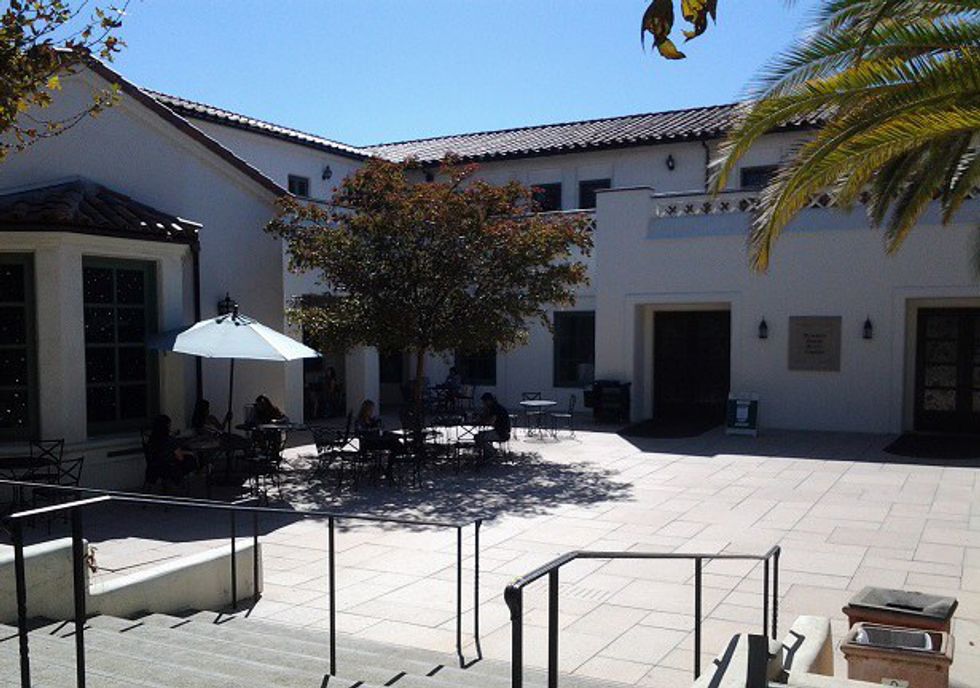The other week, a Scripps student wrote an article about our favorite reasons to visit Malott Commons. The Scripps dining hall is one of the college's crowning jewels, coming in #12 on the Princeton Review list of best campus food. But Malott Commons, for all its polished reputation, has a dark underbelly. After speaking with many students -- including some who have been protesting Malott for years, without results -- I've concluded that there are several ways Malott must change to really deserve that prestigious ranking.
1. The food is unethically sourced.
Remember that British horsemeat scandal a few years ago? You know, when frozen beef products were testing positive for horse DNA?
Or maybe you remember the 3,000 pounds of chicken sent to military mess halls that were recalled because of Listeria contamination.
Or the frozen strawberries that poisoned over 11,000 German schoolchildren with noroviruses.
And did you happen to hear that TransAfrica human rights report that revealed a certain multinational corporation to be "paying sub-par wages, denying employees breaks, withholding overtime pay," discouraging unions, and firing organized workers?
So what connects all of these news events? Well, it turns out one company is responsible for all of these PR nightmares, and that company happens to also be Malott Commons' food service supplier.
Sodexo is a French multinational corporation with a list of offenses as long as my arm. The company's record of poor quality control, union-busting, food poisoning, contamination, human rights abuses, and other scandals could take up the rest of this article and then some.
Oh, and did I forget to mention that Sodexo owns over 100 private prisons?
In 1994, Sodexo acquired a significant stock investment in the Corrections Corporation of America (CCA), a multi-national for-profit prison company infamous for insufficient and inexperienced staff and insufficient security, facilities, and medical care (due to efforts to save money and increase profits). CCA's poor management has been cited as the reason for frequent violence between inmates and a high record of escapes. By 2000, Sodexho Alliance (the name has since changed to Sodexo Group) was the largest investor in the company.
If the concept of "private prisons" sounds just the tiniest bit familiar, you might remember it from Core 1: a class all first year Scripps students are required to take. You might remember that private prisons not only incarcerate human beings for profit but also historically stem from the enslavement of African-Americans and racist "tough on crime" policies, still holding a vastly disproportionate number of nonwhite prisoners.
Scripps College requires its students to read Angela Davis' eye-opening book "Are Prisons Obsolete?" and write essays that think critically about prison reform -- while at the same time partnering with a company that has a gross history of for-profit incarceration and human rights abuses. The administration should sit in on a Core 1 class sometime; they might learn a little something about hypocrisy and injustice.
2. The food is unsafe for people with allergies and restrictions.
Although Malott says it is "committed to healthy eating options," they've received numerous complaints about their inadequate labeling and accommodation of students with dietary restrictions. Not only are there not enough allergy-free, vegan, and vegetarian options to constitute a healthy diet, but students are not even given enough information to know which items are actually safe to eat.
Scripps student Emma Geisler believes Malott is not doing enough to label its ingredients:
As a person with severe food allergies, Malott is not only stressful to navigate (as are all the dining halls) but sometimes the food is improperly labeled! Saying "nuts" when something has *peanuts* is dangerous -- because some people are allergic to peanuts, not other nuts, and peanuts aren't nuts in the first place. Additionally, sometimes the food labels aren't there at all. While it's understandable that calorie content and other similar things can be triggering to those with [eating disorders], *ingredients* should always be listed. Maybe people have allergies to uncommon things, like shellfish byproducts, food dyes, or literally any number of things. This could be easily solved by listing nutrition facts for every recipe served online. While it'd be a lot of work initially, it's pretty simple once the more common food items served at Scripps are listed already.
Student, Jessica Lin has campaigned tirelessly for Scripps to change its allergy policies:
I feel like Scripps has done little to nothing to support students at the 5Cs with food allergies. I have been forced to move off-campus because the school would not allow me to remove the meal plan, which makes it harder to go to classes, be involved with other people, and feel like part of the community. A lot of communication and interaction goes on at the dining halls, and I often feel like I'm missing out. I constantly feel guilty when friends offer to flex me in. And though sometimes I pay for myself, the dining halls only accept cash [from students not on the meal plan] and it's about $15 for dinner at some halls.
I applied for SAS funding to get pots and pans for [an allergy] club so we could cook together... but was told this was the Dean of Students' job. So I talked to the Dean of Students, but they haven't done much. They say they're happy to talk to me, but keep transferring the issue to someone else. Over the summer, they had me to talk to the director/head of the Scripps dining hall... who told me Scripps had made efforts in the dining hall before, but it was just too difficult.
THIS IS ABSOLUTE BULL****. I know the Scripps dining hall workers work hard. I am not blaming them. But it will make their lives easier if everything is labeled so I don't have to bother them and ask... Many of the workers don't know the answer if they didn't make the food that day, which is totally understandable. This is the point of labels! But the labels are often wrong or missing. [Having to ask questions] is also unfair to people behind me in line who have to wait for me to finish asking questions. Everyone is busy, and I hate holding up the line and making things harder for them, especially because I recognize people have their own individual struggles with eating/dining halls I may not be aware of (e.g. eating disorders, anxiety, social anxiety).
Other dining halls -- namely Pitzer, Frary and Frank -- have done a much better job of being gluten-free and/or putting up labels. The main [Pitzer] line has labels for gluten-free things; Frary offers gluten-free pizza every day, among other options; and Frank has great gluten-free brunch options (haven't personally checked it out much for lunch and dinner, so can't speak about that).
Many of us have allergies/health problems we don't know about. This affects all of us, one way or another -- some sooner or later. Obviously things will not change in one day or become perfect. But it would help if more people spoke up and asked for change. Right now, I feel like I'm the only one. And that's probably not true because I'm not really anything special. I'm sure people are working hard on their own. Let's consolidate our efforts and work together.
In sum, food being labelled incorrectly (and not being labelled at all) puts an undue burden on students with allergies -- a burden that could easily be avoided. Why, then, has the administration done nothing to resolve the problem?
3. Malott Commons is inaccessible to many students with disabilities.
It turns out that when you take a small dining hall and expect it to serve students from five campuses, things can get a little hairy.
Nowhere is this better demonstrated than Malott, where on some nights if you walk in at 6:15 p.m. you can expect to wait 15 minutes for a slice of pizza, 30 minutes for a salad, and 50 minutes for a bowl of pasta. The crowds are best described as "ravenous and terrifying," and mobility is severely limited by jostling lines, blocked access points, and impassable salad bars. As an able-bodied person, it's often impossible for me to navigate the Commons, and I've frequently had to sacrifice healthy food options for food I can grab and eat in time for my next class. For disabled people, the situation is much more intolerable. The tiny queue space and enormous crowds are a hazard for much of the Scripps (and 5C) population: people with social anxiety, mobility impairments, wheelchairs, crutches, weak immune systems, sensitive hearing, and claustrophobia are excluded from the dining population on any given night. (And I'm guessing the crowds are a fire hazard, as well -- ever heard of the Station nightclub fire?)
Malott Commons may be #12 on the Princeton Review, but when students are forced to avoid the hall because of basic health concerns, something is rotten in the state of Claremont. The administration needs to act to address these issues, not continue hand-waving them away. Note: administration did not respond to requests for comment.
When prospective students see those fragrant freshly-made chocolate chip cookies on their Scripps tour, or when they see happy diners and workers pictured in the College's brochure, they're not seeing the whole story. And until Scripps owns up to the problems in its backyard, they're going to continue misleading and disappointing students -- and losing business. Nobody wins, and nothing changes.
So make a fuss. Tell the administration that the current situation is not to be tolerated. Don't let them brush you aside. Get alumni and parents involved.
If enough people air out Malott's dirty underwear, maybe -- finally -- we'll see some change.
























